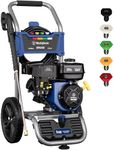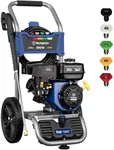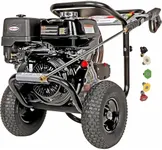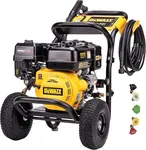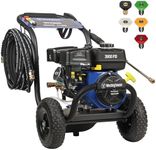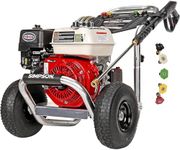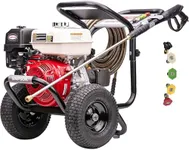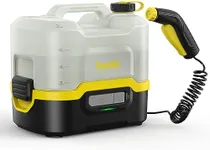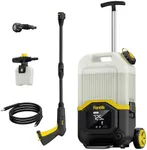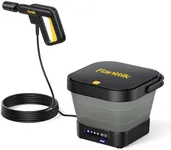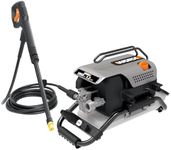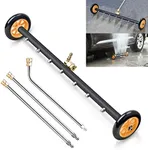Buying Guide for the Best Gas Pressure Washers
Choosing a gas pressure washer can be overwhelming because there are many options and features to consider. The right machine can make cleaning your driveway, deck, car, or house siding much easier and faster. It's important to think about the types of jobs you'll do most often, how much power you really need, how easy the washer is to move and use, and what kind of upkeep it requires. By focusing on the most important specifications and matching them to your needs, you'll be able to pick a pressure washer that works well for you and lasts a long time.PSI (Pounds per Square Inch)PSI measures the pressure output of the washer and tells you how forceful the water stream will be. This is a key factor in how well the washer can remove tough dirt and grime. Lower PSI models, under 2000 PSI, are better for lighter tasks like cleaning cars and patio furniture, while mid-range models (2000–3000 PSI) suit decks, fences, and driveways. If you need to strip paint or tackle very tough stains on concrete, a model over 3000 PSI may be best. Think about the surfaces you will clean to choose the right PSI; too much power can damage delicate surfaces, while too little may not be effective for larger cleaning jobs.
GPM (Gallons per Minute)GPM is a measure of how much water the washer can spray each minute. A higher GPM means the washer can clean bigger areas more quickly, which is especially useful for large or heavily soiled surfaces. Most homeowners do well with machines in the 2–3 GPM range, which balance efficiency and practicality. If you only plan to do smaller jobs, a lower GPM may be all you need, while larger projects may benefit from a higher GPM. Matching GPM with your cleaning needs will help you avoid wasting water and get the right cleaning performance.
Engine PowerThe engine in a gas pressure washer is rated by its cubic centimeters (cc) or horsepower (HP), which indicates its strength and ability to keep up with demanding tasks. A bigger engine usually means more PSI and GPM, but also more weight and noise. For home cleaning, a smaller engine (around 140–180cc) may be sufficient, while frequent heavy-duty jobs may require a larger engine (200cc or more). Think about how often you'll use the washer and how tough your typical jobs will be to decide if you need a more powerful engine.
Portability and WeightGas pressure washers can be heavy and bulky, so portability is important if you need to move it around your property or store it in tight areas. Lighter models are easier to transport but may be less powerful, while heavier models often have bigger wheels and sturdy frames. Consider if you will often carry the washer up and down stairs, over grass, or through gravel, and look for one with wheels and a handle that make moving it convenient for your situation.
Nozzle OptionsThe nozzle controls the spray pattern, which changes how concentrated the water force is. Washers typically come with several nozzles for different cleaning tasks—from narrow streams for tough stains to wide fans for gentle rinsing. Having multiple nozzle choices is helpful for users who need versatility across various surfaces. If you do a mix of cleaning jobs, check that the washer supports easy nozzle changes and offers a range of spray patterns to suit everything you plan to clean.
Hose Length and MaterialThe hose length affects how far you can reach without moving the washer, while the material impacts flexibility and durability. A longer hose (25 feet or more) is helpful for big areas but may reduce pressure slightly. Look for hoses made to resist kinking and damage from rubbing against rough surfaces. If you’ll be cleaning large areas, choose a longer, high-quality hose; for smaller, more confined spaces, a standard length may be more manageable.
Detergent SystemMany gas pressure washers include a detergent tank or siphon system, making it easier to apply soap or cleaners while washing. This is useful for washing cars, siding, or very dirty surfaces. Some systems are built-in, while others require you to attach an external bottle. If you expect to do a lot of soap-based cleaning, look for a washer with a convenient detergent feature that fits the types of cleaners you plan to use.
Ease of MaintenanceGas machines require regular upkeep, including oil changes, air filter cleaning, and seasonal storage steps. Some models are easier to maintain with accessible oil drains and filters, or have features that reduce the need for frequent servicing. If you want less hassle, consider models known for easy access to maintenance points or that have features designed to simplify long-term care.
